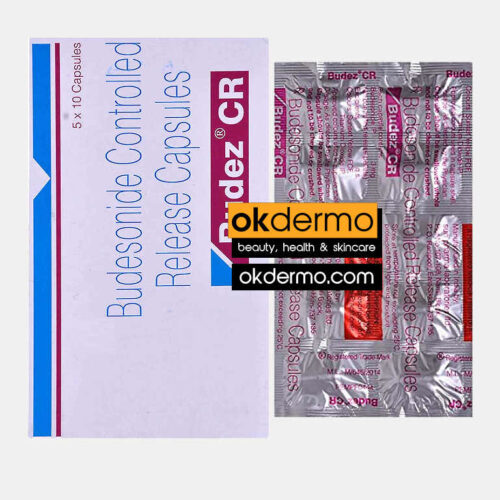Budesonide Side Effects: Unveiling Potential Risks and Considerations
Table of Contents
Clear and easy breathing is essential for a healthy life and sometimes hindered by conditions such as colitis, inflammatory disorders, and respiratory problems. In such cases, drugs like Budesonide play an important role in reducing symptoms and restoring ease of daily activities. However, this corticosteroid medication is designed to combat inflammation by providing relief to people with many health challenges.
In addition to its therapeutic uses, understanding the potential risks and side effects of Budesonide is important for making informed and balanced healthcare decisions. In this blog, we will cover the many aspects of Budesonide, highlighting its uses, Budesonide side effects and considerations for those who are dependent on its treatment.
What is Budesonide?
Budesonide is a corticosteroid drug known for its potent anti-inflammatory properties. It is prescribed to manage a variety of conditions like inflammatory bowel diseases such as colitis, asthma, allergic rhinitis and chronic obstructive pulmonary disease (COPD).
Budesonide helps to reduce swelling, redness, and pain associated with these medical conditions. It is available in a variety of forms, including inhalers, nasal sprays, oral capsules and rectal foams that allow for tailored treatment based on patient needs.
Budesonide Side Effects:
Before considering or using Budesonide, it is important to recognize the spectrum of side effects associated with this corticosteroid. However, from mild symptoms to serious concerns, understanding these side effects give you to make informed decisions about your health care.
Like any other medications, Budesonide also can cause many side effects. These can include gastrointestinal problems such as nausea, vomiting, abdominal pain, and diarrhea. Characterized by white spots in the mouth, oral hygiene is required. Some people can experience hoarseness or sore throat, especially with Budesonide tablets. Other side effects include irritation, headache, agitation, and changes in mood or behavior. Thus, any type of discussion with a healthcare provider is very important.
Budesonide 9 mg Side Effects:
Using higher doses of Budesonide, such as the 9 mg extended-release tablet, can cause certain side effects. The common adverse reactions include gastrointestinal disturbances such as nausea, vomiting, abdominal pain and diarrhea. However, patients should be alert for mouth sores and maintain proper oral hygiene. Nasal irritation, headache, dizziness and changes in mood or behavior are also possible.
-

Budecort® Budesonide Respules
Budesonide 0.5mg / 1mg
Size: 20 Respules 2ml
Brand name: EntocortEC, Ortikos, Pulmicort, Rhinocort, Uceris
From USD $21.00 Select options -

Budenase AQ® Budesonide Nasal Spray
Budesonide 100mcg
Size: 7.5ml
Brand name: Rhinocort Aqua, Benocort
USD $19.00 Add to cart -

Budez® Budesonide Capsules / Tablets
Budesonide 3mg / 9mg
Size: 150 Tablets
Brand name: EntocortEC, Ortikos, Pulmicort Flexhaler, Rhinocort, Uceris
From USD $156.00 Select options -

Budecort® Budesonide Inhaler
Budesonide 100mcg / 200mcg
Size: 200 Metered Doses Inhaler
Brand name: Pulmicort, Duoresp, Rhinocort
From USD $21.00 Select options -

Budecort® Budesonide Rotacaps
Budesonide 200mcg / 400mcg
Size: 60 Rotacaps
Brand name: Pulmicort, Rhinocort
From USD $22.00 Select options
What are the Long-Term Side Effects of Budesonide?
Long-term use of Budesonide can increase the risk of certain side effects. These can include decreased bone density (osteoporosis), increased susceptibility to infection and adrenal suppression. However, regular monitoring by a health care provider is essential to assess these potential long-term effects and adjust treatment as needed.
Budesonide for Colitis:
Budesonide is used in the treatment of colitis, including ulcerative colitis and Crohn’s disease. It helps to reduce inflammation in the colon, reducing symptoms such as diarrhea, abdominal pain, and rectal bleeding. However, like any medication, Budesonide can cause side effects and its use should be closely monitored by a healthcare provider.
Stopping Budesonide Side Effects:
Abrupt discontinuation of Budesonide can lead to adrenal insufficiency with symptoms such as fatigue, weakness, weight loss and low blood pressure. So, it is important to follow your healthcare provider’s instructions when discontinuing Budesonide to minimize the risk of withdrawal symptoms.
Does Budesonide Cause Weight Gain:
Weight gain is not a common side effect of Budesonide. However, people’s responses to medications can be felt and some can experience weight changes while taking Budesonide. It is important to discuss any concerns about weight gain or other side effects with a healthcare provider.
Oral Budesonide Side Effects:
Oral Budesonide can lead to various side effects. These can include gastrointestinal disturbances, oral thrush, hoarseness, sore throat, nasal irritation, headache, dizziness, and changes in mood or behavior.
Budesonide Side Effects Anxiety:
Anxiety is not a side effect of Budesonide. However, some people can experience changes in mood or anxiety while taking Budesonide.
Budesonide Side Effects in Toddlers:
Budesonide use in young children can cause the same side effects as adults. These can include stomach upset, oral thrush, hoarseness, sore throat, nasal irritation, headache, dizziness, and mood or behavior changes. So, parents have a responsibility to monitor young children taking Budesonide and report any symptoms to their health care provider.
Frequently Asked Questions (FAQs)
-
What is the most common side effect of Budesonide?
The most common side effects of Budesonide can be headache, nausea, stomach upset, diarrhea and dizziness. It’s essential to monitor for any reactions and report them to your healthcare provider.
-
Is Budesonide a strong steroid?
Budesonide reduces inflammation and it is potent in its anti-inflammatory effects. Also, it is considered a moderately potent steroid compared to other corticosteroids.
-
What are 3 negative effects of medication?
The negative effects of Budesonide medication can be gastrointestinal disturbances like nausea, abdominal pain, and diarrhea. It can also lead to dizziness, headaches and potential weight gain.
-
What should I avoid while taking Budesonide?
While taking Budesonide, it is advisable to avoid grapefruit and grapefruit juice because they can interact with the medication and increase the risk of side effects.
Conclusion
In conclusion, this comprehensive study of Budesonide side effects aims to empower you with the knowledge you need to effectively navigate your healthcare journey. If you understand the potential risks and precautions associated with Budesonide. You can make informed decisions by ensuring that health pursuits are aligned with your overall health. As always, consultation with healthcare providers is an important step in personal guidance and management of Budesonide treatment.
References
- https://www.nhs.uk/medicines/Budesonide-tablets-capsules-and-granules/side-effects-of-Budesonide-tablets-capsules-and-granules/
- https://www.mayoclinic.org/drugs-supplements/Budesonide-oral-route/side-effects/drg-20073233
- https://www.drugs.com/mtm/Budesonide.html
Post by:
Dr.Marcella Jiovanni
Health and Beauty Expert
“Marcella Jiovanni actively promotes the importance of maintaining healthy skin, she envisions the future of dermatology as moving away from pure medical, pharmacological dermatology and flowing more toward a holistic approach to wellness and skincare.”

















